Thunderbird revolution. Maksim Gorky
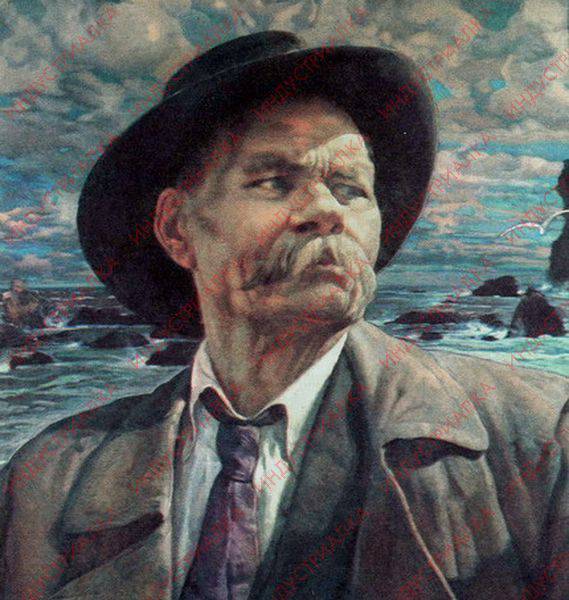
“When a person is inconvenient to lie on one side - he turns over to the other, and when it is inconvenient for him to live, he only complains. And you make an effort - roll over. "
Alexey Peshkov was born in Nizhny Novgorod on 16 (28) in March on 1868. His grandfather on his father was from ordinary people, he rose to the rank of officer, but for ill-treatment of his subordinates he was demoted as a soldier and sent to Siberia. At the age of nine his son Maxim was assigned to the workshop joiners of the city of Perm, and at twenty was already an experienced cabinet maker. Working in Nizhny Novgorod, the young man met the daughter of shop foreman Varvara Vasilyevna Kashirina and persuaded her mother Akulinina Ivanovna to contribute to their wedding, which she did. Shortly after the birth of Lesha, Maxim Savvievich and his family went to the city of Astrakhan to head the shipping company. At four years old, the boy fell ill with cholera. His father managed to get out, but at the same time he caught the infection himself and soon died. On the day of the death of Maxim Savvatyevich Varvara Vasilyevna gave birth to a premature boy, whom she named Maxim. However, on the eighth day, the newborn died. Subsequently, Alexey Peshkov, who is guilty of himself, took his fatherly and brotherly name for himself, as if trying to live for them unlived lives.
After the death of her husband, Gorky's mother decided to return to Nizhny Novgorod to her parents. Soon after arriving home, Varvara Vasilyevna remarried, and Leshino spent her childhood under the supervision of her grandmother and grandfather. Grandma Akulina Ivanovna was a needlewoman-lace maker, she knew a great many folk songs and fairy tales, and, according to Gorky, "she was not afraid of anyone or anything but black cockroaches." Grandfather Kashirin, “a redhead and a ferret-like one,” burlached on the Volga River in his youth, and then gradually broke into people and for thirty years he was a shop foreman. His children (and then their grandchildren, including the “Lexey”), grandfather Kashirin, in the process of “raising”, mercilessly sec. At the age of seven, Alexey was seriously ill with smallpox. Once in delirium, he fell out of the window, as a result of which his legs were lost. Fortunately, after recovery, the boy went again.
In 1877, Alesha was assigned to an elementary school for the poor. There he appeared, in his own words, "in a coat worn out of a grandmother's jacket, in navypod pants and a yellow shirt." It was “for the yellow shirt” that Peshkov received in the school the nickname “Ace of diamonds”. In addition to his studies, Alexey was engaged in rags - collected nails, bones, paper and rags for sale. In addition, Peshkov hunted the theft of timber and firewood from warehouses. Subsequently, the writer said: "In the settlement, theft was not considered a sin, being for the half-starved bourgeois not only a habit, but almost the only means of living." Despite a more than cool attitude to school, at the end of the year, Aleksei, who had a phenomenal memory since his childhood, received a certificate of merit from the school: “for good behavior and success in science, excellent for others”. Right on a commendable list, a well-heeled student deciphered the abbreviation of the NSC school as Our Svinskoye Kunavinskoe (instead of Nizhny Novgorod Slobodskoye Kunavinskoe). The blind-eyed grandfather did not consider the inscription and was pleased.
When Peshkov was twelve, his mother died of consumption. The story “Childhood” written on the eve of the First World War ends with these words of grandfather Kashirin to his grandson: “Well, Alexey, you are not a medal. I don’t have a place on my neck, but you go to people ... ” There was nothing particularly cruel in the deed of the grandfather, at that time it was a common practice of training for working life. "In People" Alexey Peshkov began to serve in the shop of "fashionable shoes." Then he got a job as a student for his great-uncle, the contractor-builder and draftsman Sergeyev. The uncle was a good man, but "the women seized his little boy." Instead of drawing, Lesha had to clean the dishes, wash the floors and darn socks. As a result, he escaped and entered as a steamer on a steamship pulling a barge with prisoners. There, a local chef read the boy. Inspired by books, Peshkov often left the dishes unwashed. In the end, the boy drove from the boat. In the following years, he changed a lot of classes - he sold icons and learned to write them, catch birds for sale, served with the same Uncle Sergeyev as foreman at the construction of the famous Nizhny Novgorod Fair, worked as a port loader ...
At the same time, Alexey did not stop reading, since there were always people who gave him new books. From popular prints like “Golden Dirt” and “Living Dead” that bloomed the dull life of a teenager, Peshkov gradually got to the works of Balzac and Pushkin. I read Alexey, as a rule, at nights with a candle-shaped candle, and in the daytime I tried to find out from those around me who, for example, were the Huns, bringing the questioned to confusion. At 1884, sixteen-year-old Alexey Peshkov made a decision to enroll at the University of Kazan. To study, having remembered Mikhail Lomonosov, he was taught by one friend, a Kazan gymnasium student. However, upon arrival in the city, it turned out that it was not only early, but also early to gain knowledge of the young man. In Kazan, Peshkov lived for about four years, and he had his own universities here.
The young man graduated from the first course among the movers, crooks and tramps, about which Gorky later wrote: “They were strange people, and I didn’t understand much in them, but they were very rich in their favor because they did not complain about life. Ironically, mockingly, they spoke about the well-being of the “ordinary people”, but not out of disguised envy, but as if out of pride, from the consciousness that they live poorly, but in themselves much better than those who “live well”. At that time, the young man walked literally around the edge - according to the writer's own confession, he "felt quite capable of a crime and not only against the" sacred institution of property "...". Alexey passed the second course in a bakery, where, working seventeen hours a day, he kneaded up to three hundred kilograms of dough. Peshkov's third year was conspiratorial work - the Tolstoyans “seminars” were interspersed with the Nietzschean “seminars”, since the youth was interested in everything. The village of Krasnovidovo near the city where he worked at a local shop became the fourth and last course of his Kazan universities.
In 1887, Gorky's grandmother died, her grandfather survived by only three months. At the end of their lives, both Christandron beings. Peshkov never had real friends, and there was no one to tell him his grief. Subsequently, Gorky sarcastically wrote: “I regretted that in those days of acute angst there was no dog or horse beside me. And I did not guess to share the grief with the rats - there were many of them in the doss house, and with them I lived in a relationship of good friendship. ” At the same time, a nineteen-year-old boy from complete disillusionment in people and in life shot himself in the chest. Peshkov survived, but he punched a lung for himself, because of which he subsequently earned tuberculosis. Later, Gorky will mention this in My Universities.
In 1888, the future writer left Kazan and set off on a journey through Russia. All the places that Gorky visited were later marked on his literary map. First, Peshkov on a barge sailed along the Volga to the Caspian Sea, where he joined the fishing gang. It is in the fishery that the action of his story “Mallow” takes place. Then the young man moved to Tsaritsyn, where he worked at railway stations as a watchman and weigher. After that, he went to Leo Tolstoy in Moscow. By that time, Aleksey had decided to establish a Tolstoy colony, however, land was needed for this. She decided to borrow it from the famous writer. However, the newly made Tolstoyan did not find Lev Nikolayevich at home, and Sofia Andreevna met the “dark slacker” pretty cool (although she treated Kofi with a bun). From Khamovnikov, Gorky went to the Khitrov marketplace, where he was beaten to a pulp. Having recovered, the young man in the “bestial carriage” returned to Nizhny Novgorod (at 1889), where no one was waiting for him.
Peshkov was not taken to the army with his leaky lungs, and he settled into a beer warehouse. His job was to deliver drinks to the points (in modern terms, the future writer was a sales manager). At the same time, he, as before, attended revolutionary circles, as a result of which he spent two weeks in prison. In Nizhny Novgorod, Gorky also met with the writer Vladimir Korolenko. Alexey Maksimovich was soon bored with work at the warehouse, and the young man went to the law office as a clerk. At the same time, Peshkova caught up with love - for the wife of the former exile Olga Kaminska, who was nine years older than him. And in April, 1891, he again went on a journey. For a year and a half, the future writer proceeded all over the south of Russia from Bessarabia to Ukraine and from the Crimea to the Caucasus. Whoever he was working with was a fisherman, a cook, and a farmhand, was engaged in the extraction of oil and salt, worked on the construction of the Sukhumi-Novorossiysk highway, funeral the deceased and even gave birth. The fate of the vagabond confronted the young man with a variety of people, he later wrote: "Many educated people lived a humiliating, half-starved, difficult life, wasting valuable forces on finding a piece of bread ...".
Having reached Tiflis, Alexey Maksimovich got a job at local railway workshops, in which more than two thousand people worked. As everywhere in the Caucasus, there were many political exiles. The future writer made acquaintance with many of them, including the old revolutionary Kalyuzhny. It was he who, having listened to Alexei's wandering haunts (by the way, Peshkov was an excellent storyteller), advised him to write them down. So in the middle of September 1892 in the newspaper Kavkaz published the story Makar Chudra, a gypsy legend of Loyko Zobar and beauty Radda. Signed essay was the pseudonym "Maxim Gorky." Following Alexei Maksimovich, Olga Kaminskaya arrived in Tiflis, divorcing her husband, with her daughter. And in 1892, Gorky, together with Olga Yulievna, returned to Nizhny Novgorod and settled down to the old place - the clerk at the law office. At this time, the stories of a novice writer with the support of Vladimir Korolenko began to be published in Kazan's Volzhsky Vestnik, in Moscow's Russian Gazette and in a number of other publications.
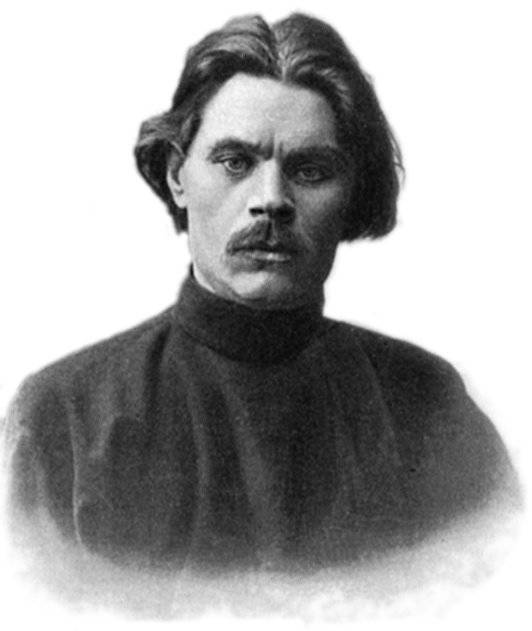
Life with Kaminsky did not work, and at some point Alexey Maksimovich said to her lover: “It seems to be better if I leave.” And, really, left. In 1923, he wrote about it: “So ended story first love Good story despite a bad ending. ” Since February, 1895 Gorky has been in Samara — thanks to Korolenko’s recommendation, he was invited to the Samara newspaper as a permanent columnist for newspaper news. For Sunday numbers, he wrote fiction satires, signing them extremely strange - Yehudiil Chlamyda. Samara in the correspondence of Gorky appeared "Russian Chicago", a city of beggars and fat cats, "wild" people with "wild" morals. The newly appeared journalist asked: “What did our rich merchants’ wealthy and important things for the city, what does it do and what does it suppose to do? I know only one thing behind it - hatred of the press and its persecution in various ways. ” The result of these incriminations was that Chlamydah was firmly beaten by two men hired by one of the “offended” money bags. In addition to newspaper habits, Alexey Maksimovich managed to compose prose - 1895 printed Chelkash created a year earlier, and from 1896 to 1897 Bitter one after another wrote the stories Malva, Spouses Orlov, Konovalov, Former People and some other works (about twenty), now classic. He tried himself in poetry, but the experience was unsuccessful, and Gorky tried not to return to this anymore.
In August, 1896, an unknown employee of the Samara Newspaper, Aleksey Peshkov, proposed the proofreader of the same newspaper, Ekaterina Volzhina. Soon they got married. Ekaterina Pavlovna was the daughter of a ruined landowner, a man “small, pretty and simple,” as her husband described her in one of the letters to Chekhov. The wedding took place in the Ascension Cathedral, and the same day the couple went to Nizhny Novgorod, where the writer got a job as a columnist for the “Nizhny Novgorod leaf”. In the fall, Alexey Maksimovich fell down with consumption and, leaving the newspaper, in December, he left to recover his health in the Crimea. He did not have any money, and he allocated a Literary Fund for a trip to the young writer after a corresponding request. At the end of July, 1897 in the Ukrainian village of Manuylovka, where Alexey Maksimovich continued treatment, the son was born from the young, who was named Maxim.
In the spring of 1898, two volumes of Essays and Stories by Alexei Maksimovich came out of print and instantly glorified the author - the end of 1890 and the beginning of 1900 in Russia was marked by Gorky. It should be noted that in May 1898 of the writer was arrested and sent to Tiflis by a postal train, where they imprisoned Metekh prison for several weeks. In society, the incident caused a storm of indignation, and the circulation of the book of the writer who suffered from the "royal satraps" instantly sold. In captivity, Alexey Maksimovich’s illness worsened, and after he was released, he again went to the Crimea. There he met and met Chekhov, Bunin and Kuprin. Gorky sincerely admired Anton Pavlovich: “This is one of Russia's best friends. Friend truthful, impartial, intelligent. A friend who loves the country and compassionate her in everything. ” Chekhov, in turn, noted: "Gorky is an undoubted talent, moreover, this is real, great ... I don’t like everything about what he writes, but there are things that are very, very popular ... He is real."
In 1899, Gorky arrived in St. Petersburg, where he made contact with Repin (who immediately painted his portrait) and Koni. And in 1900 a significant event happened - Alexey Maksimovich nevertheless met Leo Tolstoy, who noted at their first meeting in his diary: “It was Gorky. Well talked. I liked him - a real man of the people. ” At the same time, the writer finished the book “Thomas Gordeyev” and wrote “Three”, which became a kind of challenge to Dostoevsky’s “Crime and Punishment”. By 1901, fifty Gorky’s works have already been translated into sixteen foreign languages.
Being in 1901 in St. Petersburg, Alexey Maksimovich sent a mimeograph (a device for printing leaflets) to Nizhny Novgorod revolutionaries, for which he was arrested. However, he did not stay in the prison of Nizhny Novgorod for long: Lev Tolstoy, through a friend, gave the Minister of Internal Affairs a note in which, among other things, reported that Gorky was "a writer, appreciated in Europe too." Under public pressure, Aleksei Maksimovich was released, but he was put under house arrest. Repeatedly the “sufferer” of the house was visited by Chaliapin and sang, “gathering crowds of onlookers under the windows and shaking the walls of the dwelling”. They, by the way, firmly made friends. It is a curious fact that, at a young age, both at the same time went to be hired by the choir of the Kazan Opera Theater, and Gorky was then accepted, but Chaliapin was not.
At the same time, in Nizhny Novgorod, Alexey Maksimovich organized a tea-house called “Stolby” especially for the tramps. It was a very unusual teahouse at the time - they did not supply vodka there, and the inscription at the entrance reported: “Alcohol is poison, like arsenic, henbane, opium, and many other substances that kill a person ...”. It is easy to imagine the indignation, bewilderment and amazement of the “balkashes” who were treated to tea and biscuits in “Pillars”, and were given a concert of amateur performances for a snack.
At the end of May 1901, the writer had a daughter, named Ekaterina, and in 1902 Alexey Maksimovich was awarded the link he was serving in Arzamas. Gorky’s impressions of this place are reflected in the story “The Town of Okurov”, containing an epigraph from Dostoevsky “... county and bestial wilderness”. Seeing him at the station resulted in a real demonstration. At the same time, Gorky (who was held in the police under the nickname Sweet) said with irony to the gendarmes: “You would have acted smarter if you had made me the governor or gave the order. It would ruin me in the eyes of the public. "
In February, the 1902 Academy of Sciences elected Alexei Maksimovich as an honorary academician in the category of fine literature. But after the intervention of Nicholas II (the fame of the rebel writer reached the emperor), who wrote the conclusion: “More than original,” the election was declared invalid. It is worth noting that the name “elegant” is indeed difficult to attribute to Gorky literature, however, the tsar had other arguments for the opinion expressed. Out of solidarity, Chekhov and Korolenko, who learned about this and elected to the Academy, decided in solidarity to give up their titles. At the same time, one rather unpleasant incident occurred in Nizhny Novgorod with Gorky. One December evening, a stranger approached a writer who was returning home alone, hit Alexei Maksimovich in the chest with a knife and disappeared. Saved the writer by chance. Gorky, who smoked more than seven dozen cigarettes a day, always carried with him a wooden cigarette case. A knife stuck in it, a coat and jacket easily pierced.
In October, GNY's autobiographical play, The Tradesmen, was staged by 1902 at the Stanislavsky Art Theater. She had a great success, but the next play, “At the Bottom,” created such a sensation, which no drama ever had in the theater. The play was truly good - Chekhov, who introduced Alexey Maksimovich to Stanislavsky, after reading her "almost jumped from pleasure." Soon began her triumphal march through Europe. For example, in Berlin to 1905 "At the bottom" played more than five hundred (!) Times.
In 1903, Gorky finally moved to Moscow, becoming the head of the publishing house "Knowledge", which produced four almanacs per year. There was no more popular publishing house in the country in those years - starting from thirty thousand copies, the circulation gradually rose to the “giant” for that time six hundred thousand. In addition to Gorky, in the almanac such famous writers as Andreev, Kuprin, Bunin were published. Here the young and prickly literary shoots, which occupied the positions of social-critical realism, stretched. Her representatives, by the way, were ironically called “submaximos,” since they copied both Gorky's literary style, and his manner of dressing, and his Volga style. At the same time, Alexey Maksimovich, who never had a close friend, became close friends with Leonid Andreyev. The writers were united not only by the almost cult service of literature, but also by the rebelliousness of the people of the city suburbs, as well as contempt for danger. Both at one time tried to commit suicide, Leonid Andreev even argued that "a person who has not tried to kill himself is cheap."
In Moscow, Alexey Maksimovich broke up with his married wife. They parted as friends, and the writer provided her and her children all her life (his daughter Catherine died of meningitis in 1906). Soon after, Gorky began to live in a civil marriage with Maria Andreeva, an actress of the Moscow Art Theater and the daughter of the main director Alexandrinka. However, this was not all - Maria Fedorovna was an active Bolshevik, wearing the party nickname Phenomenon. And in 1905, the writer himself was at the center of revolutionary events. On the eve of January 9, he had a conversation with Witte, warning the Chairman of the Committee of Ministers that if the blood spilled on the streets, the government would pay for it. All Bloody Sunday, Gorky was among the workers, personally watched their execution, he himself almost died, and at night wrote an "Appeal" calling for a struggle against the autocracy. After that, Alexey Maksimovich went to Riga, where he was arrested and sent to St. Petersburg. Sitting alone in the Peter and Paul Fortress, he wrote the play “Children of the Sun” - a work about the transformation of the intelligentsia. At the same time, the whole of Russia and Europe protested against Gorky’s persecution — Anatole France, Gerhart Hauptmann, and Auguste Rodin were noted ... Released under a giant bail of ten thousand rubles, without the right to leave the capital, Alexei Maximovich was looking forward to the trial could well have become a stronger performance than At the Bottom, but in the fall of 1905 (after the release of the October 17 Manifesto) the case against the writer was stopped.
Already in October, 1905, with the participation of Gorky, organized the revolutionary newspaper "New Life", which, among other things, published Lenin's article "Party Literature and Party Organization." And at the end of 1905 in Moscow, a rebellion broke out with the construction of barricades and fierce battles. And again, Gorky was an active participant in the events taking place - his apartment on Vozdvizhenka served as a warehouse weapons and the headquarters of the revolutionaries. After the defeat of the uprising, the arrest of the writer was a matter of time. The party, which he joined with Andreeva, sent him away from sin to America. There was here and utilitarian goal - to raise funds for the needs of the RSDLP. In February, 1906 Alexey Maksimovich left Russia for a long seven years. In New York, Gorky was met with great enthusiasm. The writer met with American writers, spoke at rallies, and also published an appeal "Do not give money to the Russian government." In America, the envoy of Russian literature met the famous Mark Twain. Both writers grew up on the banks of great rivers, both took unusual pseudonyms - probably, therefore, they really liked each other.
In September, 1906 Bitter left the United States and settled in Italy on the island of Capri. Emigration was experienced by him quite hard - often Alexey Maksimovich asked friends to bring him a “simple black bread” from Russia. And there were a great many visitors to the writer, among whom were both cultural figures (Shalyapin, Andreev, Bunin, Repin) and revolutionaries (Bogdanov, Lunacharsky, Lenin). On Capri, Gorky took up "his old cause" - began to compose. He, like Gogol, worked well in Italy - here he wrote "The Town of Okurov", "Confession", "Vassa Zheleznova", "Tales of Italy" and "The Life of Matvey Kozhemyakin".
In 1913, in connection with the three-hundredth anniversary of the House of Romanov, an amnesty was declared to disgraced writers. Gorky took advantage of this and returned home in December. Russia met the writer with open arms, Alexei Maksimovich settled in the capital, continuing his revolutionary activities. The police, of course, did not leave him attention - at one time Gorky, replacing each other, was watched by twenty agents. Soon the First World War broke out, and the very next day after the declaration of war, the writer noted: “One thing is for sure - the first act of the world tragedy begins.” On the pages of “Chronicle”, Alexey Maksimovich led an active anti-war propaganda. For this, he often received soapy ropes and curse letters from ill-wishers. According to Chukovsky’s memoirs, having received a similar message, “Alexey Maksimovich put on his unpretentious glasses and carefully read it, emphasizing the most expressive lines with a pencil and automatically correcting errors”.
In the chaos of the events of the February revolution, Gorky, again surprising everyone, relied on culture and science. He said: "I do not know anything else that can save the country from destruction." Having distanced himself from all political parties at this time, the writer established his own tribune. The newspaper "New Life" printed opposition to the Bolsheviks of Gorky's article, in 1918 collected in the book "Untimely thoughts." In late July, the 1918 Bolsheviks closed the New Life. At the same time, Lenin stated: “Bitter is our man and will certainly return to us ...”.
Alexey Maksimovich did not just say that culture would save the country, he did a lot and “beyond” words. In the famine years (at 1919), he organized the World Literature publishing house, which produced the best essays of all time. Gorky attracted well-known writers, scholars and translators to cooperation, among whom were: Blok, Gumilyov, Zamyatin, Chukovsky, Lozinsky. It was planned to release 1500 volumes, it turned out all 200 books (seven times less than planned), and still the publication of books at a time when exhausted people did not see the bread, became a real cultural feat. In addition, Gorky saved the intelligentsia. In November, 1919 was opened Art Center, which occupied the whole block. Writers not only worked here, but they also met and lived. A year later, the famous Tsekuba (Central Commission for the Improvement of the Life of Scientists) arose. Under his wing, Alexei Maksimovich took the Serapion Brothers: Zoshchenko, Tikhonov, Kaverin, Fedin. Chukovsky later asserted: "We survived those typhoid, spineless years, and this is largely due to" kinship "with Gorky, for whom all, both small and large, have become like a native family."
In August, 1921 Bitter left the country again - this time for twelve years. Despite the fact that he was seriously overworked and sick (exacerbated tuberculosis and rheumatism), it looked strange - the writer spilled out of Russia at the end of the first wave of emigration. Paradox - the enemies of the revolution were leaving, and its messenger left too. Aleksey Maksimovich, who did not approve much in the practice of the Soviets, nevertheless remained a convinced socialist, saying: "My attitude to the Soviets is definitely - I don’t think, see, or want any other power for the Russian people." Vladislav Khodasevich said that the writer left because of the then owner of Petrograd, Zinoviev, who could not bear it.
Having crossed the border, Alexey Maksimovich with his relatives, but already without Andreeva went to Helsingfors, and then to Berlin and Prague. At this time, he wrote and published “Notes from the diary” and “My universities”. In April, 1924 Bitter donkey in Italy near Sorrento. Mail from Russia was delivered to him on a donkey - otherwise the postmen could not drag the heavy bags to the writer. Gorky was written by children, village leaders, workers, and he answered everyone, with a smile calling himself a “writer”. In addition, he conducted an active correspondence with the young domestic writers, in every way supporting them, giving advice, ruling manuscripts. In Italy, he also completed the “Artamanov Case” and began his main work, “The Life of Klim Samgin”.
At the end of the twenties, life in Sorrento no longer seemed to Alexei Maksimovich quiet, he wrote: "To live here because of the fascists is getting harder." In May, 1928, he and his son Maxim went to Moscow. On the platform of the Belorussky railway station, the writer met a guard of honor from the pioneers and Red Army men. The first persons of the country were present here - Voroshilov, Ordzhonikidze, Lunacharsky ... Gorky traveled all over the country - from Kharkov to Baku and from Dniprostroi to Tiflis - meeting with teachers, workers, scientists. However, in October 1928, despite the naive exclamation of one worker from the Bauman district: “Maksimych, dear, do not go to Italy. We will treat and take care of you here too! ”, The writer left for Italy.
Before finally returning to his homeland, Gorky made another series of voyages. During his next visit, he visited Solovki, read the play “Yegor Bulychev and Others” in the Vakhtangov Theater, and Voroshilov and Stalin read the fairy tale “The Girl and the Death”, in relation to which Joseph Vissarionovich said that “this thing will be stronger than Faust.” The 1932 writer is back home. It should be noted that even in 1919 Gorky met Baroness Maria Budberg (née Countess Zakrevska). She told about their first meeting: “I was amazed by his mixture of cheerfulness, courage, purposefulness, cheerful disposition. Since then I have been closely connected with him ... ”. The connection really turned out to be “close” - this mysterious woman was the last love of the writer. She was distinguished by her business acumen and broad education, there is also evidence that Budberg was a double agent - British intelligence and the GPU. With Gorky, the baroness went abroad, but she did not return to 1932 in the USSR with her, but went to London, where she later became the mistress of HG Wells. An English agent assigned to the Baroness wrote in reports that "this woman is extremely dangerous." Maria Zakrevskaya died in 1974, destroying all her papers before she died.
Gorky loved to repeat: "An excellent position is to be a man on earth." Not a single domestic writer had such fascinating glory during his life, what fate bestowed upon Alexey Maksimovich. He was still quite alive and was not going to die, and the city was already named after him - in 1932 Stalin suggested renaming it to Gorky Nizhny Novgorod. Of course, this proposal was accepted with a bang, after which Gorky streets began to appear in almost every city, and theaters, liners, ships, steamboats, recreation parks, factories and enterprises began to appropriate the name of the legendary writer. Gorky, who returned to the USSR, himself treated the avalanche of perpetuation ironically, in 1933 he told the writer Lydia Seyfullina: “Now I am invited everywhere and surrounded by honor. He was among the collective farmers — he became an honorary collective farmer, and among the pioneers — an honorary pioneer. Just now visited the mentally ill. Obviously, I will become honorable crazy. " At the same time, Khodasevich said that in everyday life the writer was surprisingly modest: “This modesty was genuine and occurred mainly from a reverence for literature and lack of self-confidence ... I did not see a person who wore his fame with great nobility and skill ".
The entire 1933 Gorky was organizing the Writers' Union, whose chairman of the board was elected at the first congress, held in 1934 in August. Also, on the initiative of Alexei Maksimovich, the Night Working Literary University was created at 1933. A writer who came out of the lower ranks wanted to ease the path of young people to “great” literature. In 1936, the Evening Workers Literary University has become a Literary Institute. Gorky. It is not easy to list all those who studied within its walls - a lot of young people got crusts with a specialty: “literary worker”.
In May, 1934 suddenly died the only son of the writer. His death was in many ways mysterious, a very strong young man burned down very quickly. According to the official version, Maxim Alekseevich died of pneumonia. Gorky wrote to Rolland: “The blow is really heavy. Before the eyes stands the spectacle of his agony. Until the end of my days I will not forget this outrageous torture of man by the mechanical sadism of nature ... ” In the spring of 1936, Bitter himself also contracted pneumonia (it was said that he had a cold at the grave of his son). 8 of June the patient was visited by Stalin (in total, the leader had Gorky three times - another 10 and 12 of June). The appearance of Joseph Vissarionovich miraculously eased the position of the writer - he gasped and almost agonized, however, upon seeing Stalin and Voroshilov, he returned from the next world. Unfortunately, not for long. 18 June Alexey Maksimovich died. A day before his death, having come to himself from a fever, he said: "And now I was arguing with God ... oh, how I argued!"
According to the materials of the site http://www.maximgorkiy.narod.ru/ and the weekly edition “Our history. 100 Great Names »
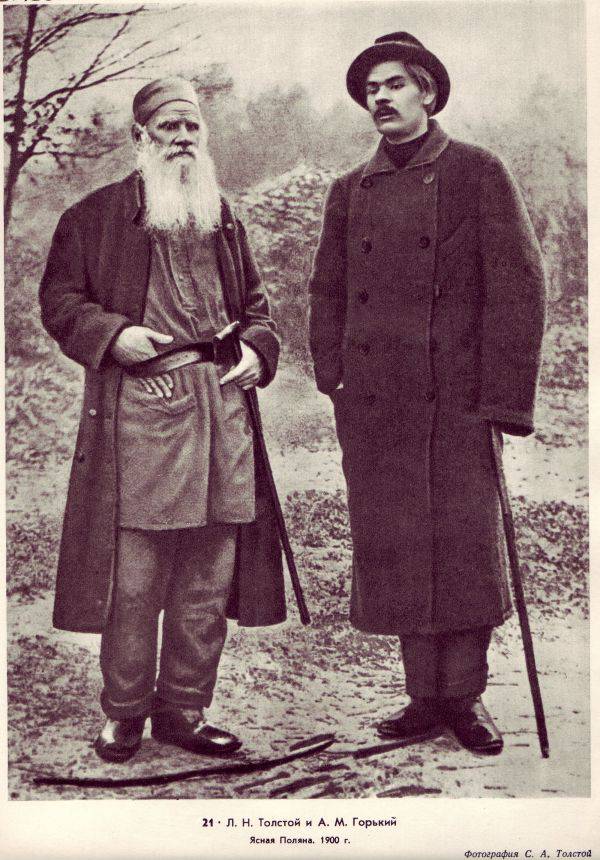
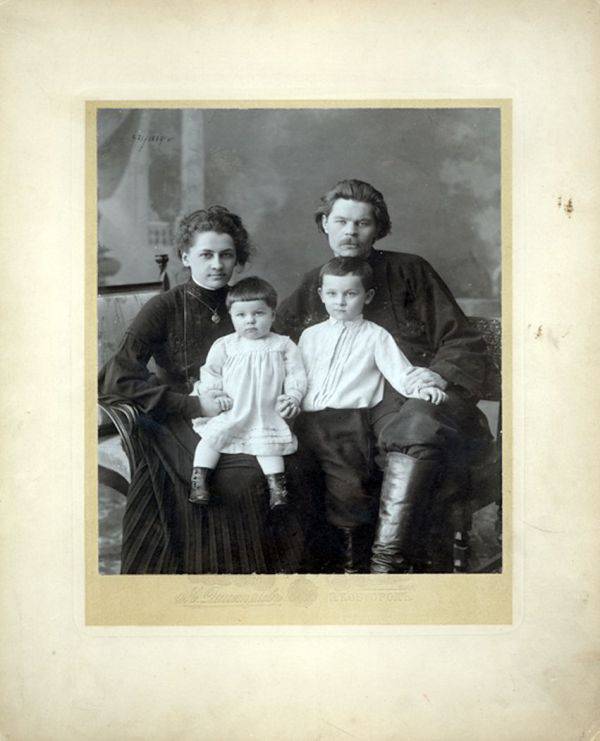
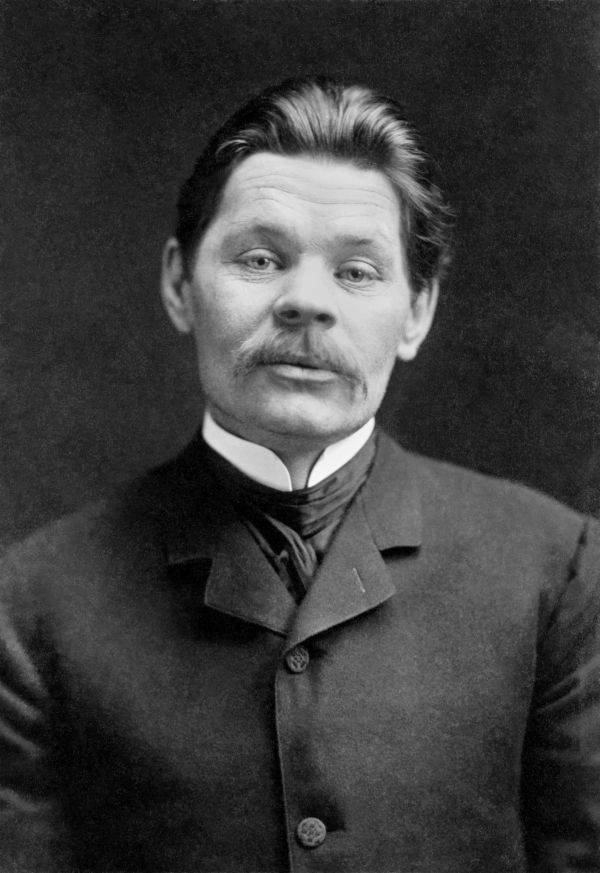
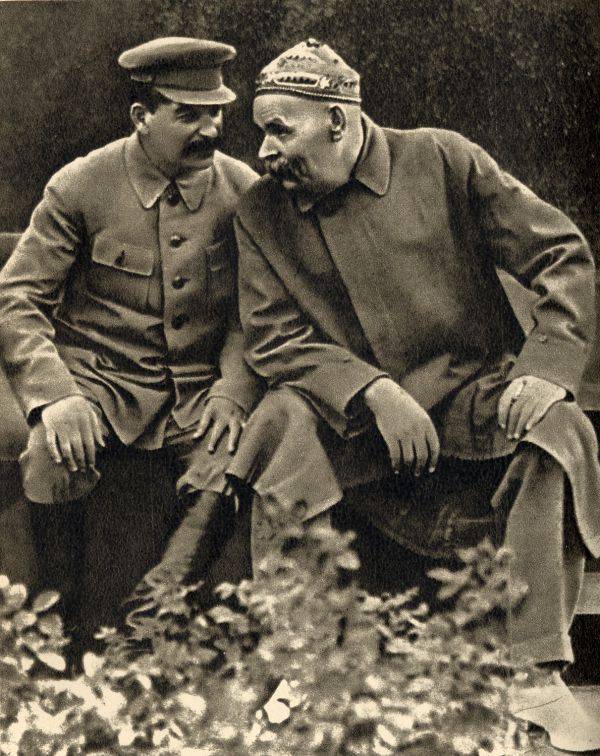
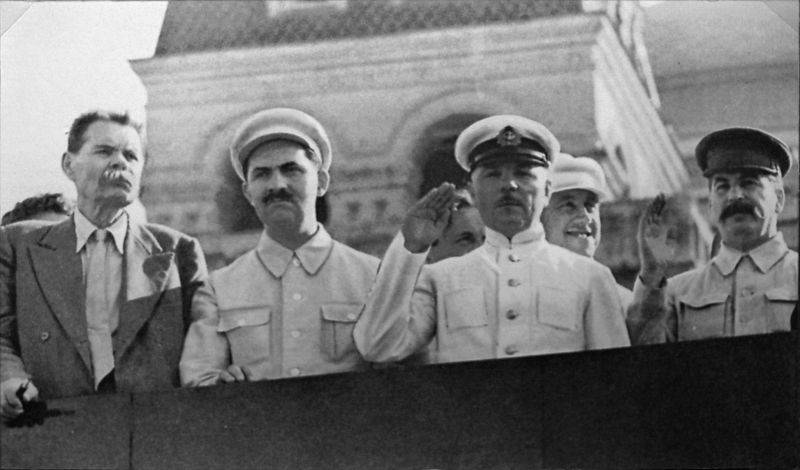
Information